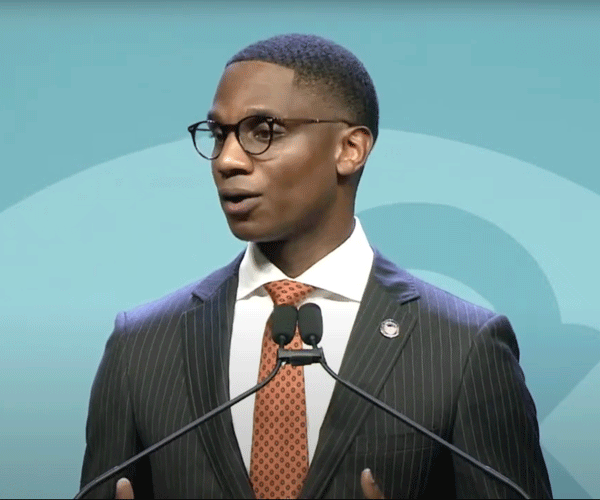The candidates for Cuyahoga County executive would like you to know how different they are. They're drawing distinctions over and over, trying to make each other's strengths into weaknesses.
To hear Democrat Armond Budish tell it, his businessman opponent "views what he does as strictly operating for the bottom line." Meanwhile, Budish says, "I believe the county has a role, an important role, a top role, in helping to lift people."
To his competitor, county councilman Jack Schron, CEO of Collinwood-based manufacturer Jergens, Budish's eight years in the Ohio House of Representatives, including two years as speaker, reveal a thirst for higher office and a partisan agenda that he'll carry into county government. The choice for county executive, Schron argued at the Sept. 29 City Club of Cleveland debate, is between a candidate "who brings 30 years of executive responsibility to run that $1.3 billion government and one who brings no executive experience whatsoever."
On Nov. 4, five years after scandal-weary voters created a new Cuyahoga County government, citizens face another choice. It's about what kind of leader they want to succeed Ed FitzGerald as executive, and what they want this still-new government to do.
The Schron-Budish race gives voters some clear choices. Do you want a CEO-style leader or an activist liberal? Should the county be a second front for the partisan battles in Columbus on election law and other issues, or will a less partisan executive be more effective? Should we still focus on post-corruption reform and efficiency, or is it time to pivot to a bigger, more ambitious government?
Running as a Democrat is Budish's key to victory. Republicans haven't won a single countywide office since 1992. So Budish keeps reminding voters that Schron is a Republican, attacking him on labor rights, voting rights and Medicaid expansion — issues more relevant to state office. Budish presents himself as a passionate advocate for the poor and for a resurgent town. "The most important skill for a county executive," Budish says, "[is] empathy for people."
Schron can only win if he attracts vast numbers of independent voters. So he asks people to look beyond party labels. As the longtime CEO who's spent four years in the new government, he argues he has the best resume. He recalls the corruption that festered during one-party rule and hits Budish for opposing the 2009 charter that created the job he wants. He implies Budish will use the post as a path to higher office. "We want somebody who actually wants to be here," Schron says. (Budish implies he wants to be executive for a long time but leaves wiggle room to run for another office in 2018.)
Despite the skirmishes, Budish and Schron agree on many issues. If Budish wins, as the political odds suggest, Schron will remain on the County Council and likely emerge as the unofficial leader of the opposition. So their race offers a preview of where the county government is going.
Both candidates embrace Cleveland's aggressive pursuit of tourism and conventions. Both want to talk to city leaders about closing Burke Lakefront Airport to free up waterfront land. Neither would encourage suburbs to merge; both would help them share services.
Both embrace the new charter's mission of encouraging job growth and its longtime role in caring for the poor. Budish wants to start a county venture capital fund and give microloans to small businesses, while Schron wants to aggressively recruit businesses to move to the county or expand here.
There are a few differences in their positions. Schron would repeal the county's $100 college scholarship program; Budish wants to keep it. Schron is against creating a department of sustainability, while Budish says the county could encourage local governments, businesses and homeowners to become more energy efficient.
Budish says he strongly supports the proposal to float a $50 million bond issue to demolish abandoned houses, which the County Council was still debating as of mid-October. Schron asks whether the $50 million will be spent strategically enough to have an impact. It isn't clear if he'll battle blight as aggressively as Budish. For now, the demolition issue illuminates their differences: the activist pushing for new programs versus the detail-oriented CEO.



